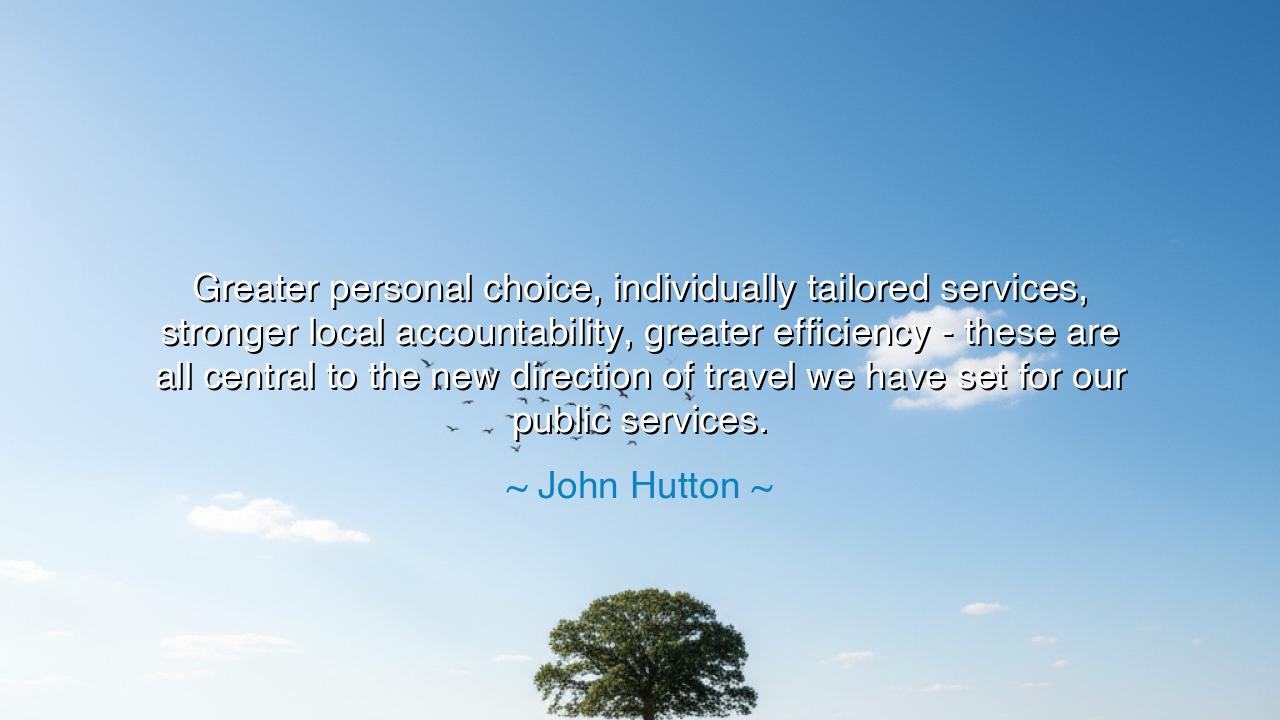
Greater personal choice, individually tailored services
Greater personal choice, individually tailored services, stronger local accountability, greater efficiency - these are all central to the new direction of travel we have set for our public services.






John Hutton, in speaking of governance and reform, once declared: “Greater personal choice, individually tailored services, stronger local accountability, greater efficiency—these are all central to the new direction of travel we have set for our public services.” At first glance, these words seem the language of policy and administration. Yet if one listens with the ears of wisdom, one hears a deeper current: the eternal struggle to balance the power of the state with the dignity of the individual, the weight of institutions with the needs of the people.
The first light in his words is choice. To grant choice is to affirm freedom. The history of humanity is written in struggles for choice: the choice of belief, the choice of ruler, the choice of destiny. In public life, to expand choice means to allow each citizen to shape their path, rather than being bound to a single imposed road. Hutton places this at the center, for a society without choice grows stagnant, but one with choice grows alive.
He then speaks of services that are “individually tailored.” This vision is not new, but as old as the wise rulers of antiquity. The best leaders saw their people not as a faceless mass but as individuals with unique burdens and gifts. Marcus Aurelius, the philosopher-king of Rome, reflected often that the role of governance was to serve the needs of the many while respecting the dignity of each. To tailor service is to acknowledge humanity in its variety, to remember that fairness is not sameness but equity.
The next pillar is accountability—the demand that those in power remain answerable to the people they serve. History offers us stark lessons in its absence: rulers who governed without accountability became tyrants, detached from the struggles of their people, blind until revolution cast them down. Yet where accountability was strong—such as in the councils of early Athens or the assemblies of certain free cities—there was vitality, innovation, and trust. Hutton reminds us that strong local accountability is the safeguard of justice, the tether that binds power to duty.
He also praises efficiency, the discipline of doing more with less, of stewarding resources so they serve rather than squander. Efficiency is not cold arithmetic—it is reverence for the toil of taxpayers, for the time and treasure entrusted to the state. History remembers reformers who cut waste and gave strength to nations. The Tang Dynasty of China prospered when its bureaucrats reformed taxes and made administration swift and fair; inefficiency, when it returned, sowed the seeds of collapse. Efficiency, therefore, is not greed but respect for the common good.
Hutton calls this a direction of travel—a powerful metaphor. He suggests that governance itself is a journey, not a fixed state. Just as a traveler must choose their compass, so too must a society chart its course. And like all journeys, it requires constant correction, vigilance, and the courage to change direction when the old path no longer serves. His words remind us that public service is never finished—it is a pilgrimage, one that must always seek greater justice, greater compassion, and greater wisdom.
The lesson we must take is profound: good governance is not measured by grandeur but by service. Leaders and citizens alike must remember that choice, service, accountability, and efficiency are not mere policies but eternal virtues of community. When these are present, the people thrive; when absent, corruption festers and trust is lost.
Practical counsel follows: in our own lives, let us demand accountability not only from leaders but also from ourselves. Let us be efficient with our time, compassionate in our service, and respectful of the choices of others. Whether we lead families, workplaces, or communities, let us set our own direction of travel toward these virtues. For in so doing, we honor not only Hutton’s vision, but the long wisdom of the ancients: that power exists not for itself, but for the flourishing of all.






AAdministratorAdministrator
Welcome, honored guests. Please leave a comment, we will respond soon